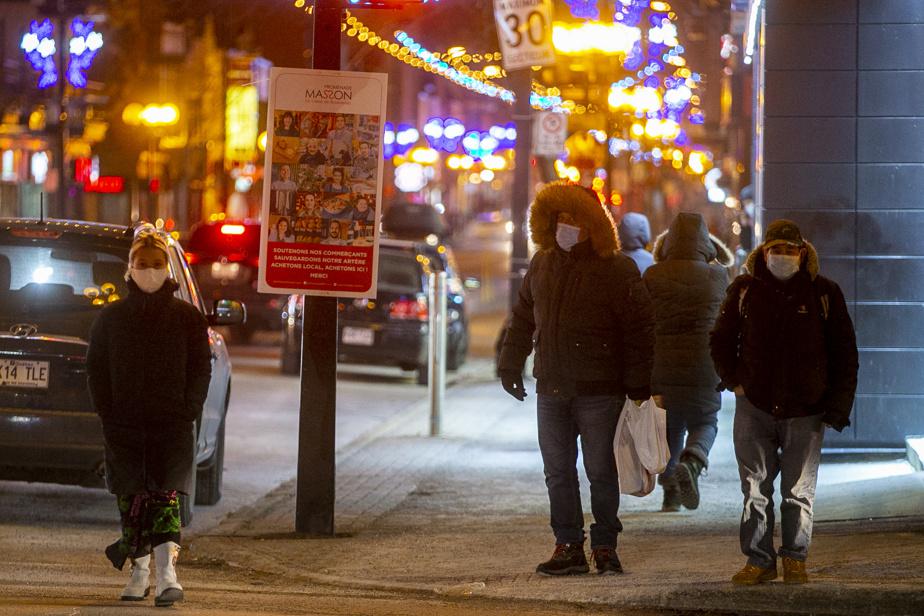There is no longer a sound at night. Or finally, yes, there are hundreds of them.
Posted on January 15It's just that these don't come from the street, but from my walls, from the heaters, from my cat. The sounds of my house are usually camouflaged by those of passers-by and sirens. However, the return of the curfew has given them all the space. They are the only ones to punctuate the darkness, to inhabit my isolation.
I had to get used to the calm that I usually try to escape.
We are preparing to lift the measure imposed since December 31. If you only knew how happy I am to find the hubbub of the city again! It's because the silence of the half-light frightens me. He makes me think I'm alone. And, alone, I don't know how to defend myself against the night...
When I left home to move to Montreal, I surrounded myself with roommates. If they all went away at the same time, I would sleep over with friends. I refused to stay in the accommodation without them, convinced that I would then be the victim of a tragedy.
An absurd fear, a consequence of horror movies that led me to believe that the house - supposed to be a refuge - actually hides monsters of all kinds that take advantage of our sense of security to better attack.
Or perhaps a consequence, rather, of all those childhood nights spent monitoring the breath of my father, who was dying of cancer. He left at dawn. It's true that tragedies happen when it's dark.
It took me five years to dare to live alone and to trust the four walls that were supposed to protect me... I then learned to rest against the tumults of the city to fall asleep.
I let myself be lulled by rue Masson. Joyful revelers, couples bickering, buses spitting out a few night owls. I felt like I was surrounded.
The neighborhood was a big house of which my apartment was just a bedroom. This idea reassured me. I can find help if needed.
(I slip here a little story for lovers of irony: a few weeks after settling into my very first three and a half, a cry woke me up. A dark cry, full of rage, followed by I turned to my bedroom window and saw through the vaporous curtain the silhouette of a man who had taken the fire escape to my balcony on the third floor. He was kicking the railing screaming. I ran to the window to slam it shut. He turned around and started banging on the glass.
Someone was trying to get into my house.
The 911 dispatcher was an angel. I swear, nothing less than an angel. He tried to comfort me, while I cried, crushed to the ground to avoid being seen by the intruder.
“Is he armed?

— I'm too scared to look.
—Then don't look. We are coming. »
I don't remember the exact words he used, but he said something like "you're not alone" or "I'm with you". I was accompanied. It would be good.
A few minutes later, several police officers arrived and forcibly took the man away. He was in psychosis. He wasn't specifically targeting me. He wasn't even aware of where he was unleashing his anger. I was not a target, just the resident of a vast house of 1.7 million inhabitants, some of whom sometimes lose the map. End of story.)
In short, the curfew has deprived me of the sound of my thousands of roommates, those neighbors and passers-by who reassure me by their mere existence, and my sleep suffers as a result.
Let’s be clear: this was the least of the negative effects of the measure here.
I have the privilege of not being one of those who fall asleep in a home where they are abused, of those who lose a rare valve to evacuate their stress or of those who fear police repression when they go out , For example.
The silence of our streets is a reflection of the leaden screed that weighs on them. On them, as on all those who do not even have a house to protect them, while having a roof is a fundamental right...
I'm not a victim here. I just notice that when a city retreats into its apartments, it is more difficult to remember that we are part of a whole. Looking forward to the imminent return of our movements.
Between a crunch that I can't recognize and that of the kibbles that break under my cat's teeth (he's always hungry around 4 a.m.), I'm thinking a lot about Marie Darrieussecq these days.
His most recent essay, No Sleep, is my bedside read. The author recounts the fight she leads every night to fall asleep, in addition to identifying the many traces of insomnia in the literary classics.
Among the sentences I highlighted, this one: “Houses were invented to shelter our sleep, our most vulnerable moment. »
Here you go.
When we sleep, our mind is drawn elsewhere, but our body remains subject to its environment. When I hear the sounds of my house at night, I sense my vulnerability. My smallness in a world of which I do not control much, finally.
Marie Darrieussecq has adopted many strategies to try to fall asleep. Lists, for example. Another highlighted passage, in my copy of Not Sleeping: "I then count my baby-sitters, I have had, strangely, as many as lovers, their memory is sometimes as emotional, the bonds as solid (a life) or also fleeting (only one night) […]. »
Take an inventory of the people you have known: this is an interesting way to push the loneliness of a bed, failing to hear all those who usually watch over our nights.
I'll give it a try, until the buzz of my neighborhood buries the breath of my house again.








